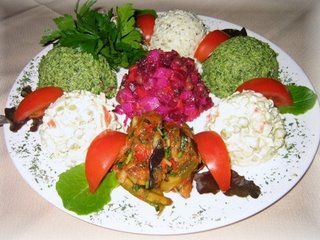The Vegetarian Culture of Malaysia
 The South East Asian nation of Malaysia is also a haven for vegetarian delicacies. Its 21 million inhabitants, who spread over 329,725 square kilometres through the island chain of the South China Sea, have been waving the vegetarian flag for centuries now.
The South East Asian nation of Malaysia is also a haven for vegetarian delicacies. Its 21 million inhabitants, who spread over 329,725 square kilometres through the island chain of the South China Sea, have been waving the vegetarian flag for centuries now.The history of Malaysian cuisine reveals the diversity of its influence. The Malay, Chinese, Indian and European people, have all contributed to this nation's diet for many centuries.
In the 3rd and 4th century, Malaysia and Indonesia were part of the Hindu Javanese Empire, connecting the Subcontinent's Hindu and Muslim religious diets. The Hindu Vedic laws and Islamic taboos against meat still influence today's population.
Westerners with their omnivorous appetites first came from Portugal, Holland and England 500 years ago. This immigration explains why most Malays have a sweet tooth for European desserts.
During the 15th century, the Chinese Ming dynasty sent diplomatic missions to the port city of Malacca, 160 kilometres southeast of Kuala Lumpur, in an effort to develop political and economic ties. The marriage of Melaka Sultan Mamsur Shah of Malaysia, and Ming Princess Hang Li Po of China, opened up trade in spices and other foods. The Chinese merchants integrated their delicacies into the Malaysia and Euro cultures, and helped to create a community known as the Baba Nonya (derived from the Malay bapak [grandfather] and Portuguese nona [grandmother]).
The Baba Nonya created a partly vegetarian cooking style known simply as Nonya, which introduced tofu, soy sauce, local spices, Indian curries and Chinese noodles to their stir-fries, desserts and condiments.
In keeping with the country's Chinese past, many stuck with the old Confucian saying: “Avoid fish that is not sound, meat that is high [and] anything overcooked or undercooked.”
Among other Malaysians, meat is not eaten by Buddhists on feast days, nor by the Hindus on Friday, their day of worship. Many of the religious and cultural festivals, from the Chinese New Year to Ramadan, feature vegetarian fare.
The standard daily diet of most Malaysians consists of curries, vegetable stir-fries and soup with rice. When travelling, visitors will have no trouble finding vegetarian fare, despite the abundance of poultry and seafood. Although English is widely spoken, you may wish to learn the phrase, “Saya hanya makan sayuram” (I eat only vegetarian foods). If you're vegan, try “Saya tidak makanan yang di perbuat dari susu atan daging (I don't eat any dairy or meat).
[Source from; www.veg.ca]




















4 Comments:
Ooooooooh, colourful, informative! Thank you!
Thank you for your comment.
Thank you for posting such great vegetarian info, and also for visiting my blog. Please come back and comment another time.
Best from California USA to you...
Your post is very educating. Thanks.
Post a Comment
<< Home